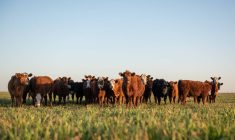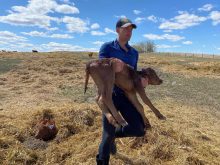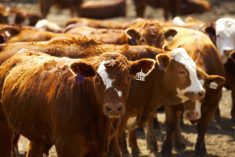“There haven’t been the resources available to go and attack the world.”
– TED HANEY, CBEF
Anewly created federal agency to develop new foreign markets for Canadian agricultural products should be fully operational by September 30.
The Agricultural Market Access Secretariat (AMAS) expects to have staff hired by September 15 amid high expectations for new export opportunities, director general Fred Gorrell said during the Canadian Cattlemen’s Association national convention.
But Gorrell warned producers not to expect miracles right away.
Read Also

Pig transport stress costs pork sector
Popular livestock trailer designs also increase pig stress during transportation, hitting at meat quality, animal welfare and farm profit, Agriculture and Agri-Food Canada researcher says
“This is new space,” he told the CCA’s foreign trade committee. “We have to walk before we can run.”
Federal Agriculture Minister Gerry Ritz announced the secretariat in early January. Its mandate is to pursue new agri-food markets, using a co-ordinated approach involving federal departments, producers and the industry.
The government acted on a recommendation for the secretariat from the Beef and Pork Value Chain Roundtable, an industry consultation group.
Gorrell called the secretariat “a better co-ordinated, more focused approach to market access.”
Agriculture and Agri-Food Canada officials will work together with the Canadian Food Inspection Agency, Foreign Trade and other departments with “a sustained regular focus” on opening up markets, he said.
Provinces want a role, too, and AMAS welcomes that, said Gorrell.
Producers hailed the secretariat as a sign that Ottawa is getting its act together in pursuing new agrifood market opportunities.
The industry often complains that the government’s approach to market access is fragmented and unco-ordinated.
A frequently heard concern is that Canada lacks high-ranking officials overseas with the ability to take action. Instead, trade matters are often handled by technical people who lack decision-making authority. As a result, it can take a long time to resolve issues, producers say.
Ted Haney, Canadian Beef Export Federation president, noted only 13 countries out of more than 100 have re-established full beef access with Canada six years after BSE closed international borders to Canadian beef. The record would be much better if AMAS had been in place all along, he said.
Until now, however, Canada hasn’t put enough time, money and people into developing greater foreign markets for agriculture, Haney said.
“There haven’t been the resources available to go and attack the world.”
Instead of sending technical people to deal with trade problems, such as BSE, Canada must send full teams, including negotiators, with the power to make deals, said Haney.
“Our negotiations must be led by negotiators who can link all the variables together, with the support of trade policy exports (and) communications experts (and) animal health, veterinarian and food safety experts.”
Gorrell said he recognized that gaining market access is sometimes more political than technical. An example is Korea’s continuing refusal to accept Canadian beef, despite Canada’s enhanced safeguards against BSE. The case is currently headed to a World Trade Organization dispute settlement panel.
Gorrell said the secretariat’s mandate includes developing markets for all agricultural products. Initially, though, it will focus on beef and pork.
AMAS will start by focusing on four key markets, likely China, Russia, India and the Middle East, he said. [email protected]


















